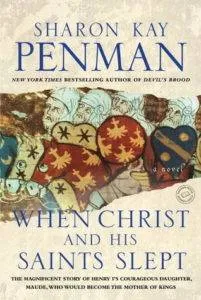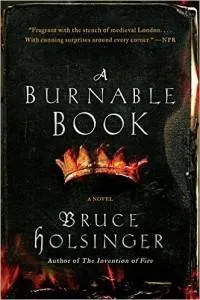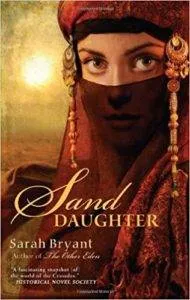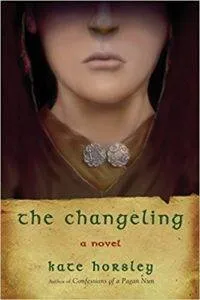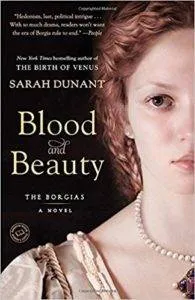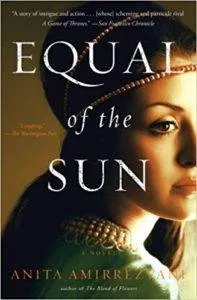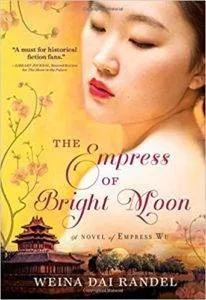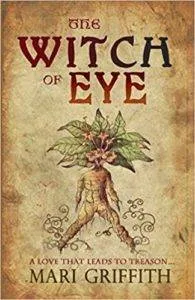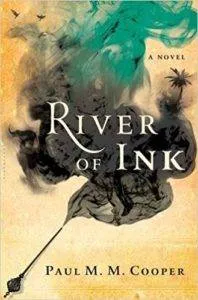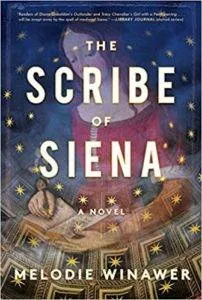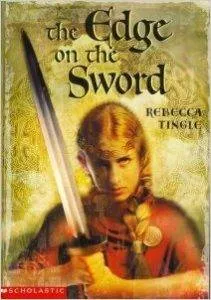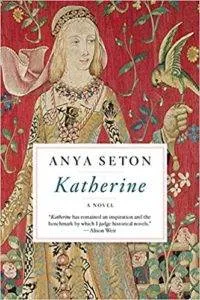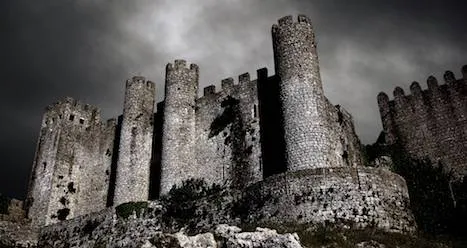
100 Must-Read Medieval Historical Fiction Novels
So, my favorite thing to read is probably medieval historical fiction. Well, maybe it is Star Trek. Historical fiction that is somehow also Star Trek would be the best, but that would involve time travel and might fuck with the space/time continuum, and then you’d get the Department of Temporal Investigation involved, and those guys are cranky. So we’ll try to avoid medieval Star Trek historical fiction. But the next best thing for me is to read lots and lots of medieval historical fiction. The Middle Ages are awesome.
But first, a question: When you think about the Middle Ages, what do you picture? Knights in shining armor? Castles and kings and queens and serfs? I’d be lying if I said that isn’t the very first thing I think of myself. And to an extent, that is part of it. But the Middle Ages are so much richer and more complex than that. It is also mainly Western ethnocentrism that makes us automatically assume the knights and castles in the first place. There was a whole globe that existed at the same time, experiencing its own stories and pain and joy, not all of which had a thing to do with knights and damsels and the rest. Also, there are a shit ton of authors of medieval fiction who aren’t, like, Bernard Cornwell. I fucking love his books, y’all, but you won’t find him listed here because I want to give other, less well-known authors a chance to play in the sandbox.
Just for the purposes of this list, and because I’m an Anglophile, I chose to define the Middle Ages in England from 510 CE (the end of the Roman Empire in Britain) to August 22, 1485 (the Battle of Bosworth Field during the Wars of the Roses, the start of the Tudor dynasty; I’ll round it up to an even 1500 CE). I know there are many, many different ways to define the era, depending on what you look at, where, and so forth. But for this post, I’m using these parameters. I used these dates for all the novels listed here, though I did have to stretch it some when searching for medieval novels written by authors of color. There is kind of a dearth of novels written by authors of color set in this time period. This is something we seriously need to talk about, folks.
Below, in a totally randomized order (thanks, random.org!), are some of the best medieval novels I’ve encountered. All blurbs are taken from the Amazon summary, where available. If not available, I blurbed it myself.
When Christ and His Saints Slept by Sharon Kay Penman
“A.D. 1135. As church bells tolled for the death of England’s King Henry I, his barons faced the unwelcome prospect of being ruled by a woman: Henry’s beautiful daughter Maude, Countess of Anjou. But before Maude could claim her throne, her cousin Stephen seized it. In their long and bitter struggle, all of England bled and burned.”
Veil of Lies by Jeri Westerson
Crispin Guest, a disgraced knight with no trade to support him and no family willing to acknowledge him, has turned to his wits to scrape a living together on the mean streets of London. He’s reinvented himself as The Tracker. In 1383, Guest is called to investigate an unfaithful merchant’s wife, leading to a murder, and now everything seems to turn on a religious relic reported to have wiped the brow of Christ—that is now missing.
The Forever Queen by Helen Hollick
“Saxon England, 1002. Not only is Æthelred a failure as King, but his young bride, Emma of Normandy, soon discovers he is even worse as a husband. When the Danish Vikings, led by Swein Forkbeard and his son, Cnut, cause a maelstrom of chaos, Emma, as Queen, must take control if the Kingdom—and her crown—are to be salvaged.”
The Wake by Paul Kingsnorth
“In the aftermath of the Norman Invasion of 1066, William the Conqueror was uncompromising and brutal. What is little known is that a fractured network of guerrilla fighters took up arms against the French occupiers. In The Wake, Paul Kingsnorth brings this dire scenario back to us through the eyes of the unforgettable Buccmaster, a proud landowner. Written in ‘a shadow tongue’―a version of Old English understandable to the modern reader―The Wake renders the inner life of an Anglo-Saxon man with an accuracy and immediacy rare in historical fiction.”
The Greatest Knight by Elizabeth Chadwick
“A penniless young knight with few prospects, William Marshal is plucked from obscurity when he saves the life of Henry II’s formidable queen, Eleanor of Aquitaine. In gratitude, she appoints him tutor to the heir to the throne, the volatile and fickle Prince Henry. But being a royal favorite brings its share of danger and jealousy as well as fame and reward.”
Illuminations by Mary Sharratt
“One of the most extraordinary women of the Middle Ages, Hildegard von Bingen experienced mystic visions from a very young age. Offered by her noble family to the Church at the age of eight, she lived for years in forced silence. But through the study of books and herbs, through music and the kinship of her sisters, Hildegard found her way from a life of submission to a calling that celebrated the divine glories all around us.”
Queen Defiant by Anne O’Brien
“Orphaned at a young age, Eleanor, Duchess of Aquitaine, seeks a strong husband to keep her hold on the vast lands that have made her the most powerful heiress in Europe. Her arranged marriage to Louis VII, King of France, is made disastrous by Louis’s weak will and fanatical devotion to the Church. In young, brilliant, mercurial Henry d’Anjou, she finds the one man who is audacious enough to claim her for his own and make her Queen of England.”
A Burnable Book by Bruce Holsinger
“London, 1385. Surrounded by ruthless courtiers, England’s young, still untested king, Richard II, is in mortal peril. Songs are heard across London said to originate from an ancient book that prophesies the end of England’s kings, and among the book’s predictions is Richard’s assassination. To find the manuscript, wily bureaucrat Geoffrey Chaucer turns to fellow poet John Gower, a professional trader in information with connections high and low. Gower discovers that the book and incriminating evidence about its author have fallen into the unwitting hands of innocents.”
A Vision of Light by Judith Merkle Riley
“Margaret of Ashbury wants to write her life story. However, like most women in fourteenth-century England, she is illiterate. Brother Gregory, a Carthusian friar with a mysterious past, agrees to write for her. As she narrates her life, we discover a woman of startling resourcefulness. Married off at fourteen to a merchant reputed to be the Devil himself, Margaret was left for dead during the Black Plague. Incredibly, she survived, was apprenticed to an herbalist, and became a midwife. But most astonishing of all, Margaret has experienced a Vision of Light that endows her with the miraculous gift of healing.”
The Good Knight by Sarah Woodbury
“The year is 1143 and King Owain seeks to unite his daughter in marriage with an allied king. But when the groom is murdered on the way to his wedding, the bride’s brother tasks his two best detectives—Gareth, a knight, and Gwen, the daughter of the court bard—with bringing the killer to justice. Once blame for the murder falls on Gareth himself, Gwen must continue her search for the truth alone, ultimately uncovering a conspiracy that will shake the political foundations of Wales.”
The Sharp Hook of Love by Sherry Jones
“Among the young women of twelfth-century Paris, Heloise d’Argenteuil stands apart. Extraordinarily educated and quick-witted, she is being groomed by her uncle to become an abbess in the service of God. But with one encounter, her destiny changes forever. Pierre Abelard, headmaster at the Notre-Dame Cloister School, is acclaimed as one of the greatest philosophers in France. His controversial reputation only adds to his allure, yet despite the legions of women swooning over his poetry and dashing looks, he is captivated by the brilliant Heloise alone.”
Shadows of the Pomegranate Tree by Tariq Ali
“Beginning with the bonfire of over one hundred thousand books taken from all of the Muslim libraries in Cordoba, a seat of great learning in Moorish Spain, the story focuses on one family who have lived in a small village near Cordoba for hundreds of years. As rumors begin to circulate of humiliations, banishments of Muslims by the conquering Christians, and even forced conversions to Christianity, the villagers can only wait in anguish for the approaching disaster.”
Outremer by Nabil Saleh
“A young Cathar from Milan travels to the Crusader kingdom to avenge his family by killing Philip of Montfort, whose father massacred Cathars in Languedoc.”
The Lady and the Unicorn by Tracy Chevalier
“Paris, 1490. A shrewd French nobleman commissions six lavish tapestries celebrating his rising status at Court. He hires the charismatic, arrogant, sublimely talented Nicolas des Innocents to design them. There, master weaver Georges de la Chapelle risks everything he has to finish the tapestries on time for his exacting French client. The results change all their lives—captured in the tapestries, for those who know where to look.”
Shadow on the Crown by Patricia Bracewell
“In 1002, fifteen-year-old Emma of Normandy crosses the Narrow Sea to wed the much older King Athelred of England. Thrust into an unfamiliar and treacherous court, Emma must defend herself against her enemies and secure her status as queen by bearing a son. Determined to outmaneuver her adversaries, Emma forges alliances with influential men at court and wins the affection of the English people. But her growing love for a man who is not her husband and the imminent threat of a Viking invasion jeopardize both her crown and her life.”
The Forty Rules of Love: A Novel of Rumi by Elif Shafak
“…Turkish author Elif Shafak unfolds two tantalizing parallel narratives—one contemporary and the other set in the thirteenth century, when Rumi encountered his spiritual mentor, the whirling dervish known as Shams of Tabriz—that together incarnate the poet’s timeless message of love.”
The Sparrow and the Hall by Donald Mace Williams
“Edgar is a churl on a small farm in England during the seventh century. He loves his wife and children, helps his neighbors, and, above all, is unswervingly loyal to Keelwolf, the thane who virtually rules this part of Northumbria. It is a turbulent time in Northumbria, but Edgar tends to his farming—until circumstances put a knife in his hand and murder in his heart.”
The Plague by Joanne Dahme
“In a land overshadowed by death, fifteen year-old Nell’s uncanny resemblance to Princess Joan brings her to act as her double—what young girl wouldn’t want to leave a life of poverty and pretend to be a princess? But when the plague catches up to the royal entourage, thwarting the King’s plan for the princess to marry the Prince of Castile and seal an alliance between their kingdoms, Nell’s life could change forever.”
The Rock: A Tale of Seventh-Century Jerusalem by Kanan Makiya
“The Rock of Jerusalem is one of the world’s most spiritually resonant and politically contentious sites. Sorting through the rubble of the three competing faiths, Kanan Makiya has woven a vivid tapestry from centuries of legend and belief to imagine the origins of Islam’s first monument, the Dome of the Rock. A narrative of mythic power, The Rock offers a grand tour of seventh-century Jerusalem and—by reminding us of how much Jews and Muslims once shared—serves as a bracing talisman for our times.”
The Needle in the Blood by Sarah Bower
“January 1067. Charismatic bishop Odo of Bayeux commissions a wall hanging, on a scale never seen before, to celebrate the conquest of Britain by his brother, William, Duke of Normandy. What he cannot anticipate is how utterly this will change his life—even more than the invasion itself. His life becomes entangled with the women who embroider his hanging, especially Gytha—handmaiden to the fallen Saxon queen and his sworn enemy.”
Sand Daughter by Sarah Bryant
“Khalidah faces an arranged marriage at the behest of her father, a Bedouin Clan chief. But when a mysterious stranger named Sulayman reveals the machinations behind her pending union, she suddenly finds herself a pawn in a deadly plot involving her own feuding tribe and the powerful Templar Knights.”
Pilgrimage by Lucy Pick
“The last thing Gebirga of Flanders remembers seeing is the argument between her parents that ended in her mother’s death. In the years since, she has learned to negotiate her family’s castle of Gistel as a blind woman but everyone assumes that one day her home will be the convent founded in her mother’s honor. An accidental encounter offers another path, and Gebirga flees her callous family with a pack of pilgrims headed along the road to Compostela. To find a place where she can belong, Gebirga must learn there are other ways of seeing the truth than with her eyes.”
The House of Kanze by Nobuko Albery
“This is an exceptional novel about an exceptional man, the greatest Japanese actor of his time and the creator (with his father) of Noh theater.”
Death Comes as Epiphany by Sharan Newman
“Catherine LeVendeur is a young scholar come to conquer her sin of pride at the Convent of the Paraclete, famous for learning, prayer, and its abbess, the fabled Heloise. When a manuscript the convent produced for the great Abbe Suger disappears, rumors surface saying the book contains sacrilegious passages and will be used to condemn Heloise’s famous lover, Peter Abelard. To save her Order, and protect all she holds dear, Catherine must find the manuscript and discover who altered the text.”
Queen by Right by Anne Easter Smith
“History remembers Cecily of York standing on the steps of the Market Cross at Ludlow, facing an attacking army while holding the hands of her two young sons. Queen by Right reveals how she came to step into her destiny, beginning with her marriage to Richard, duke of York, whom she meets when she is nine and he is thirteen. Raised together in her father’s household, they become a true love match and together face personal tragedies, pivotal events of history, and deadly political intrigue.”
Pale Rose of England by Sandra Worth
“It is 1497. The news of the survival of Richard Plantagenet, Duke of York, has set royal houses ablaze with intrigue and rocked the fledgling Tudor dynasty. With the support of Scotland’s King James IV, Richard has come to reclaim his rightful crown from Henry Tudor. Lady Catherine Gordon has no doubt that her husband will succeed in his quest. But rather than assuming the throne, Catherine would soon be prisoner of King Henry VII, and her beloved husband would be stamped as an imposter.”
Empress by Shan Sa
“The novel of one of China’s most controversial historical figures: its first female emperor, Empress Wu, who emerged in the Tang Dynasty and ushered in a golden age.”
Regicide: Peter Abelard and the Great Jewel by David Boyle
“England, 1100. King William Rufus is killed with an arrow on a hunt. Rumors start immediately that he was murdered. Nineteen years later, in France, the poet Hilary the Englishman meets a strange man who offers to buy Hilary a meal if he does him a favor. He gives Hilary a pouch of silver, and a message to be delivered to Count Fulk in Anjou. But by morning the man is dead. Hilary knows only one man can help him. His former teacher, the brilliant Peter Abelard.”
The Changeling by Kate Horsley
“The Changeling is the story of Grey, a peasant girl who is raised as a boy, and who, until adolescence, never doubts herself to be male. The revelation of her womanhood marks the beginning of her journey through a succession of changing identities—including son, wife, warrior, and mother—each of which brings its own special wisdom, but none of which, she discovers, can ultimately define her.”
Now is the Time by Melvyn Bragg
“At the end of May 1381, the fourteen-year-old King of England had reason to be fearful: the plague had returned, the royal coffers were empty and a draconian poll tax was being widely evaded. But within two weeks, the unthinkable happened: a vast force of common people invaded London, led by a former soldier, Walter Tyler, and the radical preacher John Ball, demanding freedom, equality and the complete uprooting of the Church and state. And for three intense, violent days, it looked as if they would sweep all before them.”
And Tomorrow is a Hawk by Kathryne Finn
“The year is 1486 in England. Julyana Berners’ idyllic childhood ends with the tragic loss of her beloved father, her ancestral home, even her ability to speak. Then she meets a poet who teaches her that the way out of darkness can be found with a sharpened quill, a full inkwell, and blank parchment. Thus are born Julyana’s chronicles, through which she carries us into the adventure and achievement of her long, remarkable life. It is a life that culminates when her words are set into type, making Julyana Berners the first woman to have her work printed in the English language.”
Leo Africanus by Amin Maalouf
An imaginary autobiography of Leo Africanus, “the famous geographer, adventurer, and scholar Hasan al-Wazzan, born in Granada in 1488. His family fled the Inquisition and he became an itinerant merchant, and made many journeys to the East. He was captured by a Sicilian pirate and taken back to Rome as a gift to Pope Leo X. While in Rome, he wrote the first trilingual dictionary (Latin, Arabic and Hebrew), as well as his celebrated Description of Africa, for which he is still remembered as Leo Africanus.”
The Holy Sail by Abdulaziz al-Mahmoud
“Oblivious to the invasions, massacres, and religious fanaticism that characterize the fifteenth century, a young girl falls in love with a noble Arabian tribal leader. But all eyes are on the Portuguese fleets in the Arabian Gulf, intent on securing the profitable spice trade.”
Sinful Folk by Ned Hayes
“In December of 1377, four children were burned to death in a suspicious house fire. Villagers traveled hundreds of miles across England to demand justice. Sinful Folk is the story of this terrible mid-winter journey as seen by Mear, a former nun who has lived for a decade disguised as a mute man. On this journey, she will find the strength to claim the promise of her past and create a new legacy.”
A Morbid Taste for Bones by Ellis Peters
“A Welsh Benedictine monk living at Shrewsbury Abbey in western England, Brother Cadfael spends much of his time tending his garden—but now there’s a more pressing matter. Cadfael is to serve as translator for a group of monks heading to the town of Gwytherin in Wales. The team’s goal is to collect the holy remains of Saint Winifred and bring them back to Shrewsbury. When the monks arrive in Gwytherin, the town is divided over the request. When the leading opponent to disturbing the grave is found shot dead with a mysterious arrow, some believe Saint Winifred herself delivered the deadly blow. Brother Cadfael knows an earthly hand did the deed, but his plan to root out a murderer may dig up more than he can handle.”
A Tale of False Fortunes by Fumiko Enchi
“An alternative account of an imperial love affair narrated in the eleventh-century romance A Tale of Flowering Fortunes (Eiga monogatari). Both stories are set in the Heian court of the emperor Ichijo (980–1011) and tell of the ill-fated love between the emperor and his first consort, Teishi, and of the political rivalries that threaten to divide them.”
Pillars of Light by Jane Johnson
“In the Syrian city of Akka, Nathanael, a young Jewish doctor, and a Muslim girl called Zohra are about to fall in love, unaware that Jerusalem has just been taken by Saladin’s army and that their city will soon be engulfed by war. Meanwhile in England, John Savage, a foundling boy, runs away with The Moor, a mysterious man driven by a dream of perfection. John and The Moor become members of a band of conmen travelling through the English countryside faking religious miracles for cash, until they are recruited in Richard the Lionheart’s drive to regain the Latin Kingdom from the infidel.”
Oswald by Edoardo Albert
“The second book in The Northumbrian Thrones series follows the young prince Oswald as he seeks to regain the throne taken from his family by Edwin.”
The Errant Hours by Kate Innes
“Welsh Marches, July 1284—the uprising in Wales is over, the leader gruesomely executed, the dead are buried. But for Illesa Arrowsmith, the war’s aftermath is just as brutal. When her brother is thrown into the Forester’s prison on false charges, she is left impoverished and alone. All Illesa has left is the secret manuscript entrusted to her—a book so powerful it can save lives, a book so valuable that its discovery could lead to her death.”
Blood and Beauty by Sarah Dunant
“By the end of the fifteenth century, the beauty and creativity of Italy is matched by its brutality and corruption, nowhere more than in Rome and inside the Church. When Cardinal Rodrigo Borgia buys his way into the papacy as Alexander VI, he is defined by his wealth, his love for his illegitimate children, and by his blood: He is a Spanish Pope in a city run by Italians. If the Borgias are to triumph, this charismatic politician must use papacy and family—in particular, his eldest son, Cesare, and his daughter Lucrezia—in order to succeed.”
The Book of the Maidservant by Rebecca Barnhouse
“Johanna is a serving girl to Dame Margery Kempe, a renowned medieval holy woman. Dame Margery feels the suffering the Virgin Mary felt for her son, but cares little for the misery she sees every day. When she announces that Johanna will accompany her on a pilgrimage to Rome, the suffering truly begins. Inspired by the 15th-century text The Book of Margery Kempe, the first autobiography in English, Rebecca Barnhouse chronicles Johanna’s painful journey through fear and anger and physical hardship to ultimate redemption.”
Grendel’s Mother by Susan Signe Morrison
“Brimhild weaves peace and conveys culture to the kingdom, until the secret of her birth threatens to tear apart the fragile political stability. This is the tale of Grendel’s Mother. She is no monster as portrayed in the Old English epic, Beowulf. We learn her side of the story and that of her defamed child. We learn how the invasion by brutal men is not a fairy tale, but a disaster doomed to cycle relentlessly through human history. Only the surviving women can sing poignant laments, preserve a glittering culture, and provide hope for the future.”
The Painter of Souls by Philip Kazan
“Beauty can be a gift—or a wicked temptation. So it is for Filippo Lippi, growing up in Renaissance Florence. He has a talent to see, capture, and paint the beauty in everything. But talent cannot always feed you or protect you. To survive, Pippo Lippi must first become Fra Filippo Lippi: Carmelite friar, man of God. His life will take him down two paths at once. He will become a gambler, a forger, a seducer of nuns; and at the same time he will be the greatest painter of his time, the teacher of Botticelli and the confidante of the Medicis.”
The Harrowing by James Aitcheson
“In the aftermath of 1066, a Norman army marches through the North of England, burning, killing, and laying waste to everything in its path. The Harrowing has begun. As towns and villages fall to the invaders, five travelers fleeing the slaughter are forced to band together for survival. But are they fleeing the Normans or their own troubles? As enemies past and present close in, their prior deeds catch up with them and they discover there is no sanctuary from fate.”
The Mapmaker’s Daughter by Katherine Nouri Hughes
This novel is set in the 16th century and is “the confession of Nurbanu, born Cecilia Baffo Veniero—the mesmerizing, illegitimate Venetian who became the most powerful woman in the Ottoman Empire at the height of its power under Sultan Suleiman the Magnificent—the bold backstory of the Netflix Series, Magnificent Century.”
Lady Macbeth by Susan Fraser King
“Lady Gruadh—Rue—is the last female descendant of Scotland’s most royal line. Married to a powerful northern lord, she is widowed while still carrying his child and forced to marry her husband’s murderer: a rising warlord named Macbeth. As she encounters danger from Vikings, Saxons, and treacherous Scottish lords, Rue begins to respect the man she once despised. When she learns that Macbeth’s complex ambitions extend beyond the borders of the vast northern region, she realizes that only Macbeth can unite Scotland. But his wife’s royal blood is the key to his ultimate success.”
The Abbess of Whitby by Jill Dalladay
“Chosen as Eostre’s handmaid, Hild will serve the fertility goddess for a year before being wed. Struggling in a loveless marriage, she is intrigued by the Iona priests making pilgrimages to spread Christ’s love. Inspired and guided by a charismatic enemy, she builds communities to live and teach Christ’s love.”
Hermitage Among the Clouds by Thich Nhat Hanh
“Hermitage Among the Clouds tells the story of the fourteenth century Princess Amazing Jewel, the daughter of one of Vietnam’s greatest historical Zen master kings. This beautifully written story expresses the suffering caused by war and conflict, the transformative potential of a commitment to practicing peace and building reconciliation, and the simple beauty of a spiritual life.”
Gutenberg’s Apprentice by Alix Christie
“An enthralling literary debut that evokes one of the most momentous events in history, the birth of printing in medieval Germany—a story of invention, intrigue, and betrayal, rich in atmosphere and historical detail, told through the lives of the three men who made it possible.”
The World, the Flesh, and the Devil by Reay Tannahill
“Leaving her home in the courts of Avignon, seventeen-year-old Ninian rides into the darkness and strife of Scotland to marry a stranger. Her path crosses that of Gavin Cameron of Kinveil, priest and Chancellor of Scotland. Laconic, ambitious and handsome, he is the one man the Stewart king dares to trust, the one man strong enough to save the kingdom from the civil war planned by the Archdeacon Columba Crozier and his bastard son, Adam de Verne. Tied by blood on one side and by a forbidden, love on the other, Ninian is precipitated into violence and tragedy, in which she, too, has a vital part to play.”
The Thrall’s Tale by Judith Lindbergh
“Katla, a slave, her daughter Bibrau, and their mistress Thorbjorg, a prophetess of the Norse god Odin, navigate the stormy waters of love, revenge, faith, and deception in the Viking Age settlements of tenth–century Greenland. Lindbergh’s lyrical prose captures the tenuousness of lives led on the edge of the known world, the pain of loyalties shattered by Christian conversion, and the deepest desires hidden in the human heart.”
Equal of the Sun by Anita Amirrezvani
“Legendary women changed the course of history in the royal courts of sixteenth-century England. But few people know of the powerful women in the Muslim world. In Equal of the Sun, Anita Amirrezvani’s gorgeously crafted tale of power, loyalty, and love in the royal court of Iran, she brings one such woman to life, Princess Pari Khan Khanoom Safavi.”
Watermark by Vanitha Sankaran
“The daughter of a papermaker in a small French village in the year 1320 – mute from birth and forced to shun normal society – young Auda finds solace and escape in the wonder of the written word. But this is an age of Inquisition and intolerance, when difference and defiance are punishable ‘sins’ and new ideas are considered damnable heresy. When darkness descends upon her world, Auda is forced to flee, setting off on a remarkable quest to discover love and a new sense of self…and to reclaim her heritage and the small glory of her father’s art.”
A Bloody Field by Shrewsbury by Edith Pargeter
“Henry Bolingbroke knows that he should be king of England. With the help of the powerful lords of Northumberland, especially Harry “Hotspur” Percy, Henry triumphantly overthrows Richard and imprisons him. But rebellion is in the air, and the question of how Richard II really died lingers, poisoning the court. Henry IV will need all his strength to defend the crown, but the relationships between the king, Hotspur, and the king’s son Prince Hal contain the seeds of their own destruction. The king’s powerful enemies are poised to pounce as the three men are drawn to bloody collision some two miles from Shrewsbury.”
The Horse Healer by Gonzalo Giner
“At the border of the Christian kingdom of Castile and the Muslim caliphate of Al-Andalus, a little inn sits on the front lines of the battle for Iberia. When word travels that the most feared fighters of the Muslim world, the Imesebelen, are advancing on Toledo, the innkeeper tells his son, Diego, to flee with his sisters. But Diego refuses to abandon his father. The old man and one of his daughters are slaughtered, and the other two girls are kidnapped. Now there’s only one thought on Diego’s mind: revenge.”
Edwin, High King of Britain by Edoardo Albert
“In 604 AD, Edwin, the deposed king of Northumbria, seeks refuge at the court of King Raedwald of East Anglia. But Raedwald is urged to kill his guest by Aethelfrith, Edwin’s usurper. As Edwin walks alone by the shore, he is confronted by a mysterious figure—the missionary Paulinus—who prophesies that he will ascend to greater heights than any of his forefathers.”
The Burning Times by Jeanne Kalogridis
“Mother Marie Françoise, born Sybille, is a midwife with a precocious gift for magic, which makes her a prime target for persecution at the hands of the Church. She flees her village and takes refuge in a Franciscan sisterhood. Before long, Sybille’s unusual powers bring her under the scrutiny of the Inquisition. Michel, a pious and compassionate monk sent to hear her confession, finds himself drawn more intimately into Sybille’s life and destiny than either of them could have imagined.”
The Duchess of Aquitaine by Margaret Ball
“Beautiful and brilliant, Eleanor is the daughter of the duke of Aquitaine, whose glittering court is the twelfth-century birthplace of courtly love. For all of the duke’s boasts that Eleanor has the brains of a man and the soul of a warrior, everyone knows that a girl of fifteen cannot possibly hold the richest dukedom in France. Everyone, that is, except for her dying father, who insists on leaving Eleanor his most valuable provinces—and making her prey to the first baron who rides in to kidnap her.”
Land of Wooden Gods by Jan Fridgard
“A thrall named Holme is the protagonist of Land of Wooden Gods, which centers on the slave population of Sweden in the ninth century, when the country was on the verge of Christianization. The novel begins with the abandonment of a slave baby, condemned to the wolf-infested woods by a Viking chieftain upset by thrall unrest. The ensuing action shows Holme, the father, acting as no slave has ever before.”
The Empress of Bright Moon by Weina Dai Randel
Sequel to The Moon in the Palace. “At the moment of the Emperor’s death, everything changes in the palace. Mei, his former concubine, is free, and Pheasant, the heir and Mei’s lover, is proclaimed as the new Emperor, heralding a new era in China. But just when Mei believes she’s closer to her dream, Pheasant’s chief wife, Lady Wang, powerful and unpredictable, turns against Mei and takes unthinkable measures to stop her.”
The Siege by Ismail Kadare
Awarded the first Man Booker International Prize. “A Christian citadel in the mountains of Albania is met by the envoys of the Ottoman Army—their message, accept our terms of total submission and avoid the inevitable violence. As the bloody and psychologically crushing fight for control over the citadel unfolds, Kadare’s work opens a literary window onto the eternal clash between religions and empires as well as the exhilaration, despair, and immediacy of the battlefield.”
Azazeel by Youssef Ziedan
“A twelfth-century monk, at Satan’s urging, begins writing his memoirs after Bishop Nestorius is excommunicated and burned for heresy.”
The Empress by Meg Clothier
“Constantinople, 1179. Princess Agnes of France is thirteen when she marries the heir to Byzantium, an empire unmatched in wealth, power, and glamour. But once she sets foot in the Queen of Cities, a decadent world where dazzling luxury masks unspeakable cruelty, she realises that her husband is a deluded mother’s boy with mighty enemies and treacherous allies. As emperors rise and fall, Agnes learns to play the City’s game, until she falls for a handsome rebel and finds that love is the most perilous game of all.”
The Witch of Eye by Mari Griffith
“1435, England. Eleanor Cobham has married into the highest ranks of the aristocracy – she is now the Duchess of Gloucester. She and her husband, Duke Humphrey, set up a court of their own to rival the royal court in London, surrounding themselves with fascinating and influential people. But Eleanor craves the one thing she lacks: a son and heir, and with him a possible route to the throne of England. Desperate, Eleanor turns to the one person she believes can help her: Margery Jourdemayne, a woman now remembered as the infamous Witch of Eye. Such help comes at a high price…”
Hangman Blind by Cassandra Clark
“In November 1382, the month of the dead, Abbess Hildegard rides out for York from the Abbey of Meaux. This is no ordinary journey—it is a time of rival popes, a boy king, and a shaky peace in the savage aftermath of Wat Tyler’s murder—and Hildegard has embarked on a perilous mission to try to secure the future of her priory.”
The Novice’s Tale by Margaret Frazer
“The nuns of England’s St. Frideswide’s prepare for the simple ceremonies in which the novice Thomasine will take her holy vows. But their quiet lives are thrown into chaos by the arrival of Lady Ermentrude Fenner. She demands wine, a feast…And her niece, the angelic Thomasine. The lady desires to enrich herself and her reputation by arranging a marriage for the devout novice. But all her schemes are brought to a sudden end with murder. As suspicious eyes turn on the pious Thomasine, it falls to Sister Frevisse, hosteler of the priory and amateur detective, to unravel the webs of unholy passion and dark intrigue.”
The Architect’s Apprentice by Elif Shafak
“In 1540, twelve-year-old Jahan arrives in Istanbul. As an animal tamer in the sultan’s menagerie, he looks after the exceptionally smart elephant Chota and befriends (and falls for) the sultan’s beautiful daughter, Princess Mihrimah. A palace education leads Jahan to Mimar Sinan, the empire’s chief architect, who takes Jahan under his wing as they construct (with Chota’s help) some of the most magnificent buildings in history.”
Down the Common by Ann Baer
“A novel of the strength and beauty of one woman, and all women.” This is really an Everywoman novel, the protagonist representing the human condition of all women. It is beautiful and lyrical, finding joy and beauty in the mundane.
Harem Secrets by Alum Bati
“1530, Istanbul. In the center of empire lurks sexual depravity, murder, intrigue, lies, spies, and deceit. Adam Pasha, the Chief Justice, investigates a death in the Imperial Harem.”
The Queen of Last Hopes by Susan Higginbotham
“Margaret of Anjou, queen of England, cannot give up on her husband—even when he slips into insanity. And as mother to the House of Lancaster’s last hope, she cannot give up on her son—even when England turns against them. This gripping tale of a queen forced to stand strong in the face of overwhelming odds is at its heart a tender tale of love.”
All Fall Down by Sally Nicholls
“A heartbreaking account of one of the most terrifying events in history—the outbreak of the Black Death in 1349. When Isabel’s Yorkshire village is devastated by the Black Death, it seems that the world is ending in horror and fear. But for the survivors of the terrible plague, a new and freer society will rise from the destruction of the feudal system that enslaved her family.”
Company of Liars by Karen Maitland
“The year is 1348. In a world ruled by faith and fear, nine desperate strangers, brought together by chance, attempt to flee the certain death that is rolling inexorably toward them. Each traveler has a hidden gift, a dark secret, and a story to tell. None are as they seem. And one among them conceals the darkest secret of all—propelling these liars to a destiny more perilous than any of them could imagine.”
Bodo the Apostate by Donald Michael Platt
“On Ascension Day May 22, 838, Bishop Bodo, chaplain, confessor, and favorite of both his kin, Emperor Louis the Pious, son of Charlemagne, and Empress Judith, caused the greatest scandal of the Carolingian Empire and the 9th century Roman Church.”
King Hereafter by Dorothy Dunnett
“In King Hereafter, Dorothy Dunnett’s stage is the wild, half-pagan country of eleventh-century Scotland. Her hero is an ungainly young earl with a lowering brow and a taste for intrigue. He calls himself Thorfinn but his Christian name is Macbeth.”
River of Ink by Paul M.M. Cooper
“In thirteenth-century Sri Lanka, Asanka, poet to the king, lives a life of luxury, enjoying courtly life and a love affair with a village girl he is teaching to write. But when Magha, a prince from the mainland, usurps the throne, Asanka’s role as court poet dramatically alters. Magha is a cruel and calculating king—and yet, a lover of poetry—and he commissions Asanka to translate a holy Sanskrit epic into the Tamil language spoken by his recently acquired subjects. The poem will be a symbol of unity between the two cultures. But in different languages, meaning can become slippery. First inadvertently, then deliberately and dangerously, Asanka’s version of the epic, centered on the killing of an unjust ruler, inspires and arouses the oppressed people of the land.”
Tun-Huang by Yasushi Inoue
This is “the story of Chao Hsing-te, a young Chinese man whose accidental failure to take the all-important exam that will qualify him as a high government official leads to a chance encounter that draws him farther into the wild and contested lands west of the Chinese Empire. Here he finds love, distinguishes himself in battle, and ultimately devotes himself to the strange task of depositing the scrolls in the caves where, many centuries later, they will be rediscovered.”
Queen Hereafter by Susan Fraser King
“A foreign queen in a strange land, Margaret adapts to life among the barbarian Scots, bears princes, and shapes the fierce warrior Malcolm into a sophisticated ruler. Yet even as the king and queen build a passionate and tempestuous partnership, the Scots distrust her. When her husband brings Eva, a Celtic bard, to court as a hostage for the good behavior of the formidable Lady Macbeth, Margaret expects trouble. Instead, an unlikely friendship grows between the queen and her bard, though one has a wild Celtic nature and the other follows the demanding path of obligation.”
The Bone Thief by V.M. Whitworth
“Edward, son of Alfred the Great, has inherited the Kingdom of Wessex and achieved a precarious set of alliances through marriage and military conquest. But the alliance is uneasy and the kingdom of Mercia has more reason than most to fear the might of Wessex. Their Lord is elderly and perhaps mortally sick, and his wife fears that she does not have the power to withstand hostile takeover. The chance to rescue St Oswald’s bones, beloved patron saint, to consecrate her new church and unite the people behind her, is too good an opportunity to miss. But they are rumored to be buried deep in hostile territory.”
The Queen’s Pawn by Christy English
“At only nine, Princess Alais of France is sent to live in England until she is of age to wed Prince Richard, son of King Henry II and Queen Eleanor of Aquitaine. Estranged from her husband, Eleanor sees a kindred spirit in this determined young girl. She embraces Alais as a daughter, teaching the princess what it takes to be a woman of power in a world of men. But as Alais grows to maturity and develops ambitions of her own, Eleanor begins to see her as a threat…”
Figures in Silk by Vanora Bennett
“In 1471, merchant John Lambert marries off his two beautiful daughters. The elder, Jane Shore, soon begins a notorious liaison with King Edward IV. The other sister, industrious and clever Isabel, is wed to the scion of a wealthy silk dynasty—and faces a monumental challenge when her husband is killed. Forced into apprenticeship to her mother-in-law, Isabel learns to love the exotic fabrics from Italy, Persia, Spain, Tunisia, and beyond, discovering both loyal friends and dangerous enemies. But Isabel’s most powerful alliance will be with sister Jane’s royal lover.”
Vlad: The Last Confession by C.C. Humphreys
“Winter 1431, a son is born to the Prince of Transylvania. His father christened him ‘Vlad.’ His people knew him as ‘The Dragon’s Son.’ His enemies reviled him as ‘Tepes’—The Impaler. He became the hero of a nation. We know him as Dracula. Vlad: The Last Confession is a novel about the real man behind the Bram Stoker myth. It tells of the Prince, the warrior, the lover, the torturer, the survivor and, ultimately, the hero.”
The Rabbi’s Knight by Michael J. Cooper
“The year is 1290—twilight of the Crusades. War-weary Knight Templar, Jonathan St. Clair, is garrisoned in the port city of Acre and more interested in learning Kabbalah than fighting Muslims. He possesses an ancient scroll with a cryptic inscription, the key to unlocking the secrets of Jerusalem’s Temple Mount. But none of the Jewish scholars in Acre can decipher the inscription. The one man able to decipher the scroll’s meaning, Rabbi Samuel of Baghdad, has been targeted for assassination. Deep in enemy territory, St. Clair apprentices himself to Rabbi Samuel as they travel to Jerusalem, risking everything to fulfill their shared and sacred destiny as guardians of the Temple Mount.”
The Scribe of Siena by Melodie Winawer
“Accomplished neurosurgeon Beatrice Trovato knows that her deep empathy for her patients is starting to impede her work. So when her beloved brother passes away, she welcomes the unexpected trip to the Tuscan city of Siena to resolve his estate, even as she wrestles with grief. But as she delves deeper into her brother’s affairs, she discovers intrigue she never imagined—a 700-year-old conspiracy to decimate the city.”
The Book of Saladin by Tariq Ali
“The fictional memoir of Saladin, the Kurdish liberator of Jerusalem, as dictated to a Jewish scribe, Ibn Yakub. Saladin grants Ibn Yakub permission to talk to his wife and retainers so that he might present a full portrait in the Sultan’s memoirs. A series of interconnected stories follows, tales brimming over with warmth, earthy humor and passions in which ideals clash with realities and dreams are confounded by desires.”
Flame in the Mist by Renee Ahdieh
In medieval Japan, Mariko, the daughter of a prominent samurai is betrothed to the son of the Emperor’s favorite concubine. On the way to the palace, she narrowly escapes an ambush by “the Black Clan, who has been hired to kill her before she reaches the palace. Dressed as a peasant boy, Mariko sets out to infiltrate the Black Clan and track down those responsible for the target on her back. Once she’s within their ranks, Mariko finds for the first time she’s appreciated for her intellect and abilities.”
Another Me by Eva Wiseman
“Seventeen-year-old Natan has a safe and happy life in fourteenth-century Strasbourg, France. He works with his father in his rag trade, helps his mother around the house, and studies the Torah at night with his young brother, Shmuli. He’s even feeling the first stirrings of love. But when rumors begin to circulate that Jewish residents are contaminating the town’s well water to try to hasten plague’s arrival in their city, Natan knows that there are dangerous days ahead.”
Kiraze by Solmaz Kamuran
“Even against the vivid backdrop of the sixteenth-century Ottoman Empire, Esther Handali stood out. Widow of an Istanbul rabbi and refugee from the Spanish Inquisition, she established herself during the reign of Suleiman the Magnificent as an intermediary between the women of the sultan’s seraglio and the world outside the harem to which they were confined.”
Hild by Nicola Griffith
“She is destined to become one of the pivotal figures of the Early Middle Ages: Saint Hilda of Whitby. But for now she has only the powerful curiosity of a bright child and the precarious advantage of a plotting uncle, Edwin of Northumbria, who will stop at nothing to become overking of Angles. Hild establishes a place for herself at his side as the king’s seer, and she is indispensable—as long as she doesn’t lead Edwin astray.”
My Name is Red by Orhan Pamuk
“The Sultan has commissioned a cadre of the most acclaimed artists in the land to create a great book celebrating the glories of his realm, illuminated in the European style. But because figurative art can be deemed an affront to Islam, this commission is a dangerous proposition.”
Shadow of the Swords: An Epic Novel of the Crusades by Kamran Pasha
“Saladin, a Muslim sultan, finds himself pitted against King Richard the Lionheart as Islam and Christianity clash, launching a conflict that still echoes today. In the midst of a brutal war, Saladin finds forbidden love in the arms of Miriam, a beautiful Jewish girl with a tragic past. But when King Richard captures Miriam, the two men must face each other in a personal battle that will determine the future of the woman they both love.”
The Edge on the Sword by Rebecca Tingle
“When fifteen-year-old Æthelflæd is suddenly and reluctantly betrothed to an ally of her father, the king, her world will never be the same. As a noblewoman in the late 800s, she will be expected to be meek and unlearned—and Flæd is anything but. Her marriage will bring peace to her land, but while her royal blood makes her a valuable asset, she is also a vulnerable target. When enemies attack, Flæd must draw upon her skills and fight to lead her people to safety and prove her worth as a princess, and as a warrior.”
The Moon in the Palace by Weina Dai Randel
“A concubine at the palace learns quickly that there are many ways to capture the Emperor’s attention. Many paint their faces white and style their hair … some present him with fantastic gifts … while others rely on their knowledge of seduction to draw his interest. Young Mei knows nothing of these womanly arts, yet she will give the Emperor a gift he can never forget.”
Manuscript Found in Accra by Paulo Coelho
“1099. Jerusalem awaits the invasion of the crusaders who have surrounded the city’s gates. Inside the ancient city’s walls, women and men of every age and faith have gathered to hear the wisdom of a mysterious man known only as the Copt. As the wise man speaks, his words offer truth and guidance, and reveal the human values that have endured throughout time.”
The Corpse Reader by Antonio Garrido
“After his grandfather dies, avid scholar and budding forensic investigator Cí Song begrudgingly gives up his studies to help his family. When another tragedy strikes, he’s forced to run and deemed a fugitive. Dishonored, he has no choice but to accept work as a gravedigger, a position that allows him to sharpen his corpse-reading skills. Soon, he can deduce whether a person killed himself—or was murdered. Inspired by Song Cí, considered to be the founding father of forensic science, this harrowing novel set during the thirteenth-century Tsong Dynasty draws readers into a multilayered, ingenious plot as disturbing as it is fascinating.”
Plague Land by S.D. Sykes
“Oswald de Lacy was never meant to be the Lord of Somerhill Manor. Inheriting unexpectedly at seventeen, Oswald has no experience of running an estate. He finds the years of plague and neglect have changed the old place dramatically. Before he can do anything, Oswald is confronted by the shocking death of a young woman. The ambitious village priest claims that she was killed by a band of demonic dog-headed men. Oswald is certain this is nonsense, but proving it is quite a different matter. And then the body of another girl is found.”
Samarkand by Amin Maalouf
A lyrical novel about the eleventh century Persian poet Omar Khayyam.
The Vatican Princess by C.W. Gortner
“With the ascension of the Spaniard Rodrigo Borgia as Pope Alexander VI, a new era has dawned in Rome. Benefitting from their father’s elevation are the new pope’s illegitimate children—Cesare, Juan, and Lucrezia—each of whom assumes an exalted position in the papal court. Privileged and adored, Lucrezia yearns to escape her childhood and play a part in her family’s fortunes. But Rome is seductive and dangerous. Lucrezia is plunged into a perilous gambit that will require all her wits, cunning, and guile.”
Katherine by Anya Seton
“Katherine is an epic novel of a love affair between Katherine Swynford and John of Gaunt, Duke of Lancaster, the ancestors of most of the British royal family. Set in the vibrant fourteenth century of Chaucer and the Black Death, the story features knights fighting in battle, serfs struggling in poverty, and the magnificent Plantagenets who rule despotically over a court rotten with intrigue. Within this era of danger and romance, John of Gaunt, the king’s son, falls passionately in love with the already-married Katherine.”
The Anchoress by Robyn Cadwallader
“England, 1255: Sarah is only seventeen when she chooses to become an anchoress, a holy woman shut away in a small cell at the side of the village church. Fleeing the grief of losing a much-loved sister as well as the pressure to marry, she decides to renounce the world and commit herself to a life of prayer. But when she starts hearing the voice of the previous anchoress whispering to her, seemingly from the stones themselves, it soon becomes clear that even the thick, unforgiving walls of Sarah’s cell cannot protect her as well as she had thought.”
A Plague on Both Your Houses by Susanna Gregory
Matthew Bartholomew is an unorthodox physician and teacher of Medicine at the fledgling University of Cambridge. In 1348, the inhabitants of Cambridge live under the shadow of a terrible pestilence that has ravaged Europe and is travelling relentlessly eastward towards England. Bartholomew, however, is distracted by the inexplicable death of the Master of Michaelhouse, which the University authorities do not want investigated. Bartholomew defies the University and begins his own enquiry. And then the Black Death finally arrives and Bartholomew is dragged deeper into a quagmire which threatens not only his life, but the continued existence of the University and the future of the town.


